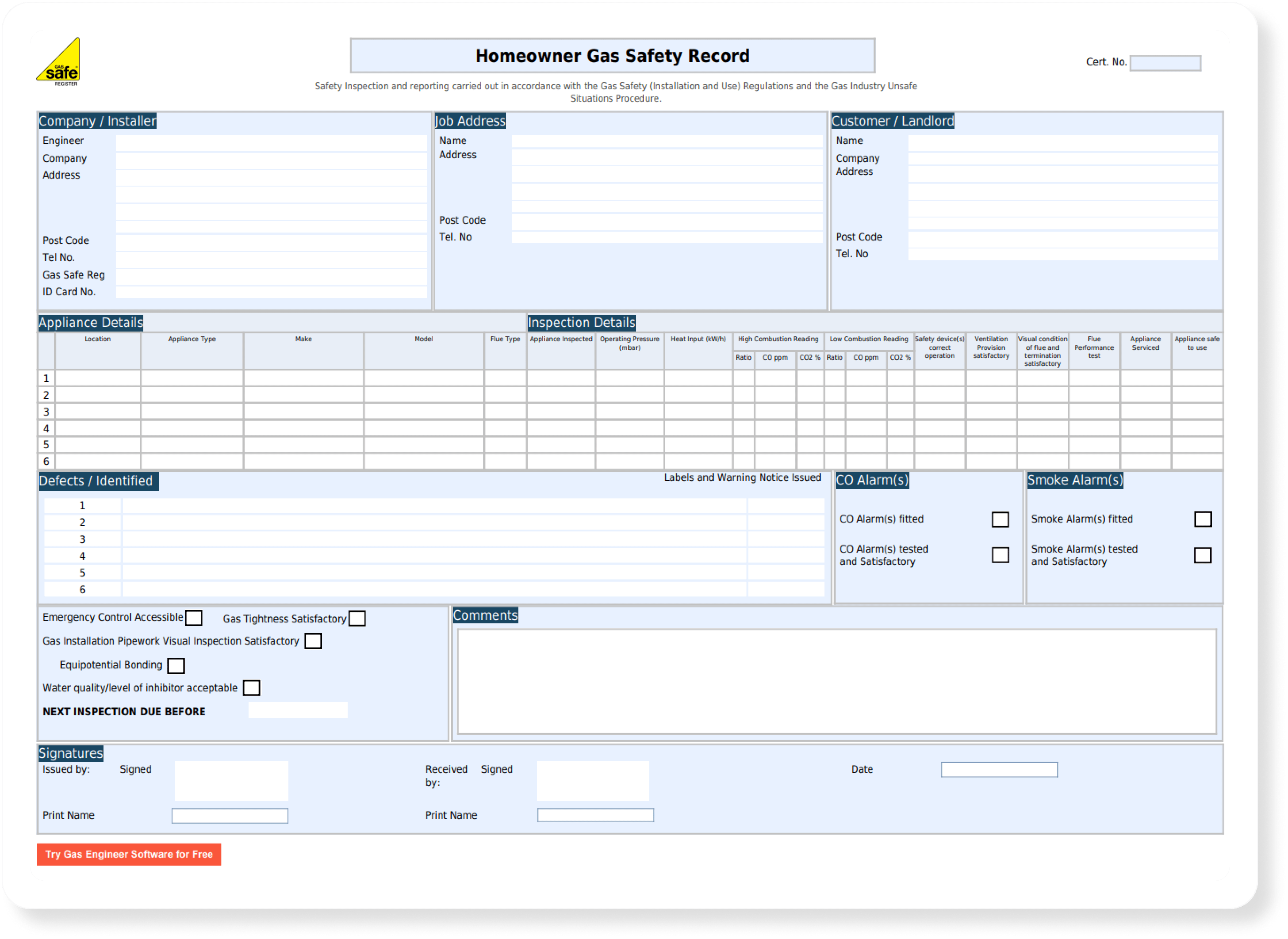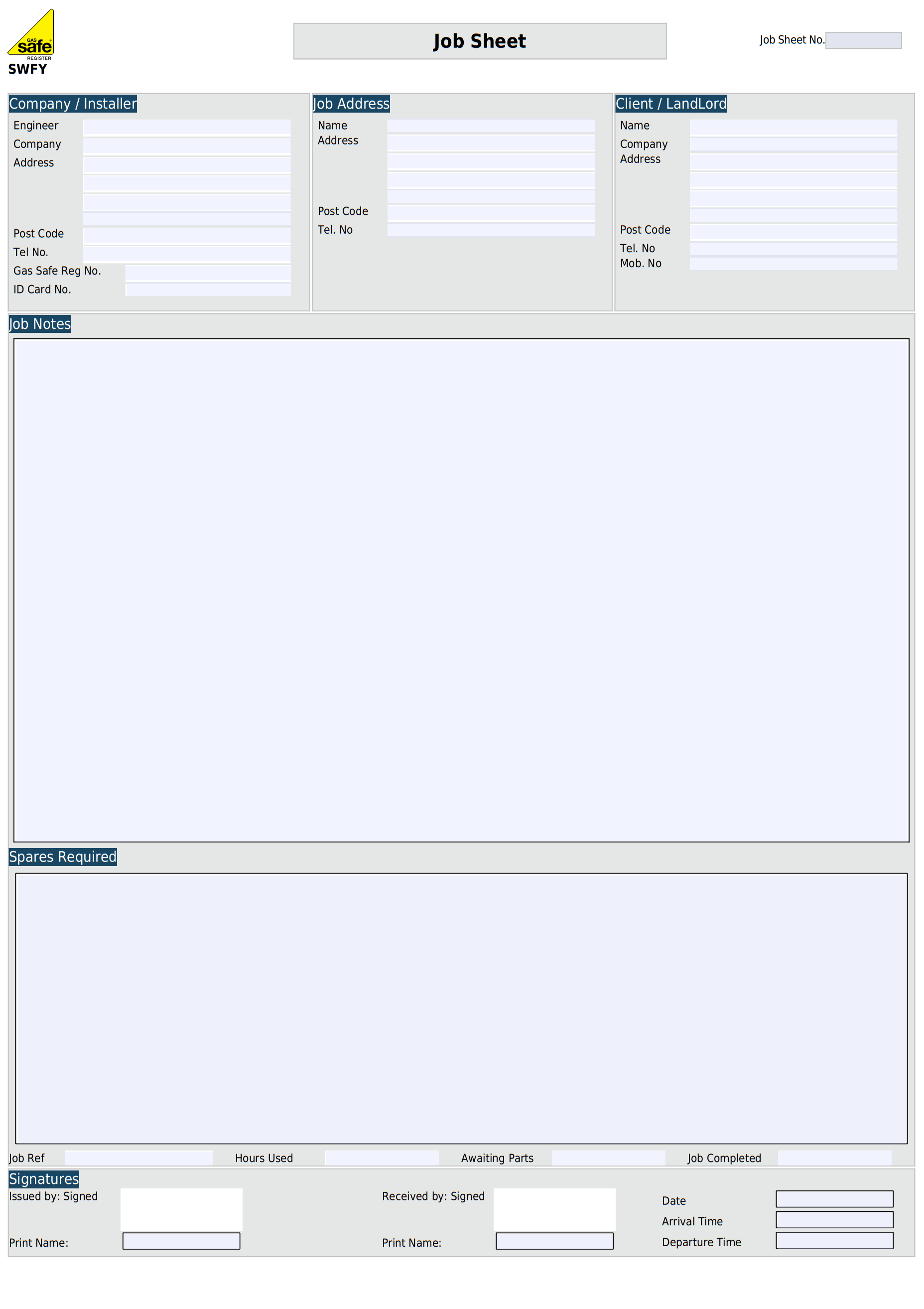What Makes A Good Job Sheet?
![[Featured Image] Job sheets](https://gasengineersoftware.co.uk/wp-content/uploads/2024/03/Featured-Image-Job-sheets.png)
Job sheets are (and have been for a long time) a staple in the trades world. They’re a simple way to help businesses organise their team and keep detailed records.
Mostly used by businesses with remote field workers, job sheets help note down details of a job to keep office teams, engineers, and customers all on the same page.
But not all job sheets are created equal. Paper, digital, detailed, simple – what is it exactly that makes a good job sheet? And how should you be creating yours for your heating & plumbing business?
These are all questions we’ll answer in this article.
What is a job sheet?
A job sheet is a document containing details of a particular job.
It needs to cover all important information such as engineer, property, and customer details, description of the work required, work done, and materials used.
In your heating & plumbing business, there may be several different touch points for each job. You might have a manager to assign and schedule work, office staff who handle the invoicing, and of course engineers who work in the field and do the work.
Job sheets connect all these moving parts and allow for a much more streamlined business workflow.
Job sheets can be customised to fit your business. Traditionally, they would be handwritten documents or photocopies. Now, most businesses have moved on to creating digital job sheets through software that can be viewed, edited, and shared from anywhere at any time.
Why are they important?
In a nutshell, job sheets are important because they keep everything together. In many ways, they’re like a food recipe: not only will it help you buy the right ingredients, but also guide you on the steps to take when cooking them up.
Let’s break this down into 4 distinct areas:
#1: An informed team
An engineer that has no idea what needs to be done is a recipe for disaster – to no fault of their own.
Job sheets keep everyone informed and allow your team to perform at their best, finishing jobs faster and to a better standard. They’ll know what tools they need to bring, whether they need to make a trip to the merchants to pick up a new boiler – all of this can save hours of time each day.
This directly translates to engineers that earn you more money and enjoy working in your business.
#2: Easy record keeping
You never know when you might need to go back and find details about a job you did previously. Job sheets help keep track of all this information in a document you know where to find. This is made even easier if you manage job sheets digitally rather than in a filing cabinet as big as the Tardis.
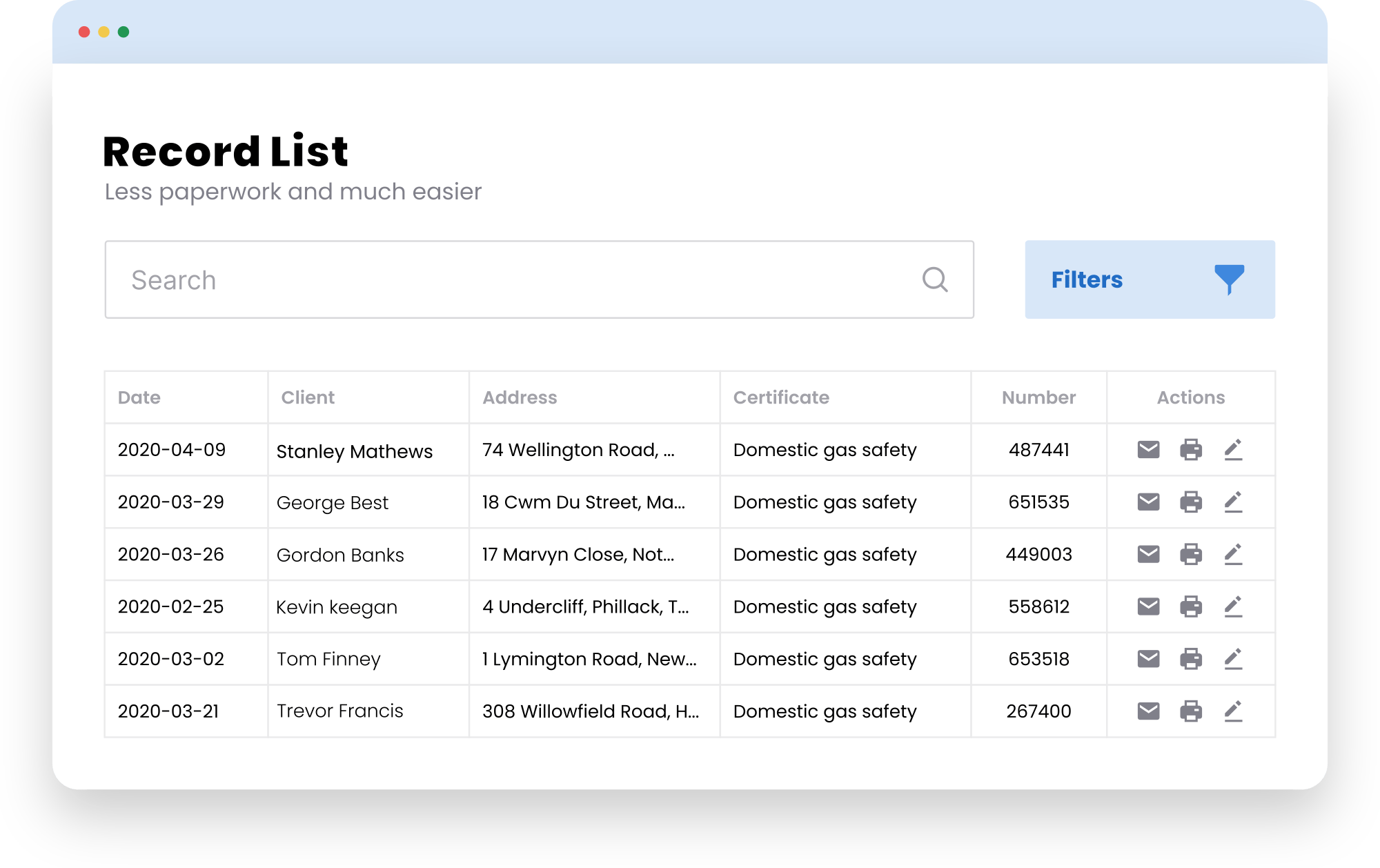
#3: Better scheduling
A good online calendar is the backbone of any scheduling process, but a job sheet can be really useful if you want to know more about a job to estimate how long it will take. The more you know, the better you’re able to manage your engineers’ time and work. Learn more about scheduling here.
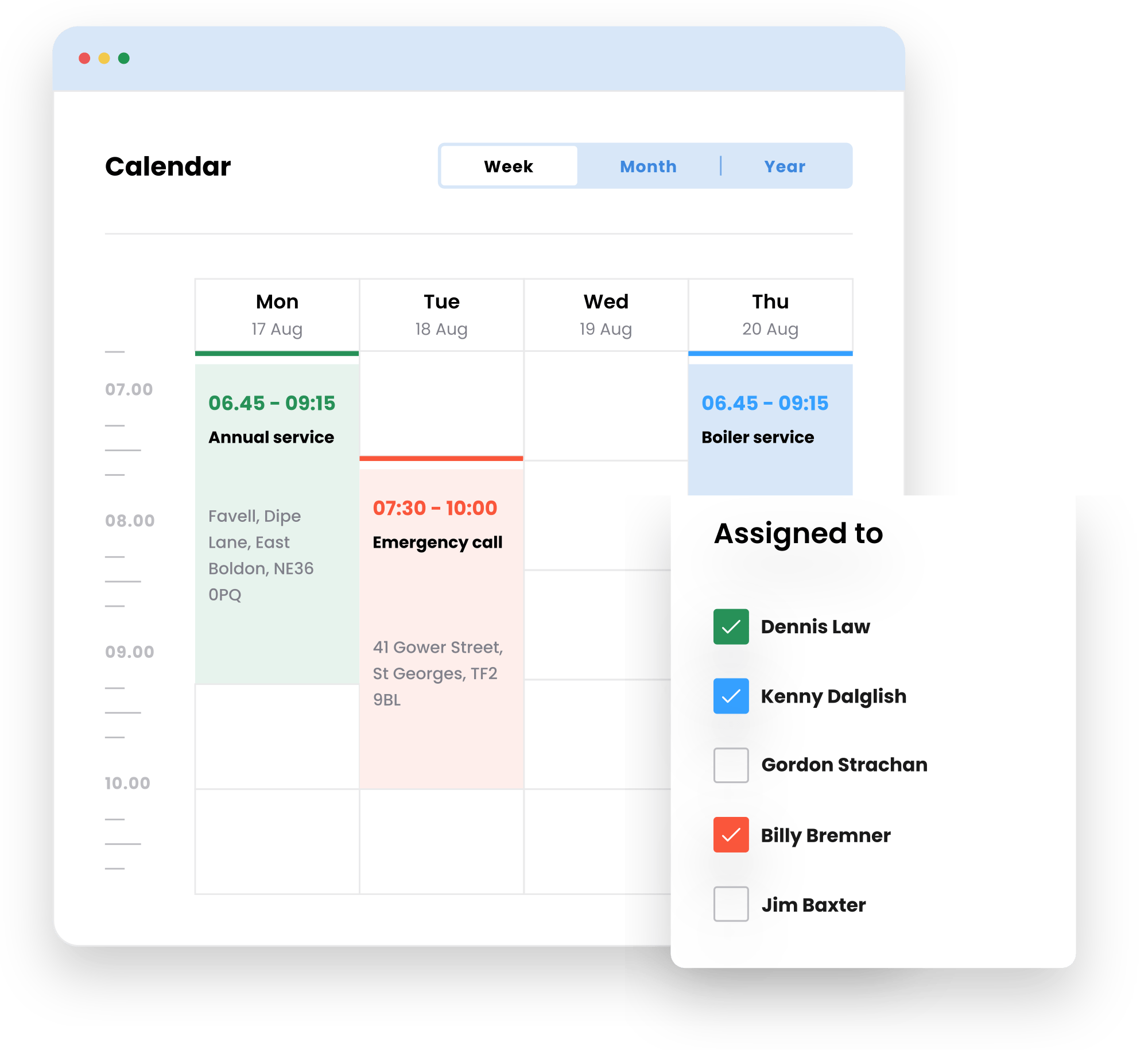
#4: Happier customers
Everything we’ve just talked about filters down to one thing: your customers. A higher standard of work and engineers that know what they’re doing are a guaranteed way to impress customers and keep you in their good books.
What needs to be included on a job sheet?
- Company & Engineer details
- Customer details & address
- Job notes, including sub-tasks, scope, serial numbers
- Spares required
- Job reference number
- Hours used
- Any parts that are awaiting delivery
- Signatures
- Dates (including completion date)
- Arrival & departure times
Beyond this, make sure it’s got your company logo on it to add that extra stamp of professionalism.
What separates good and bad job sheets?
A good job sheet is a clear indication of a business that has all its parts together.
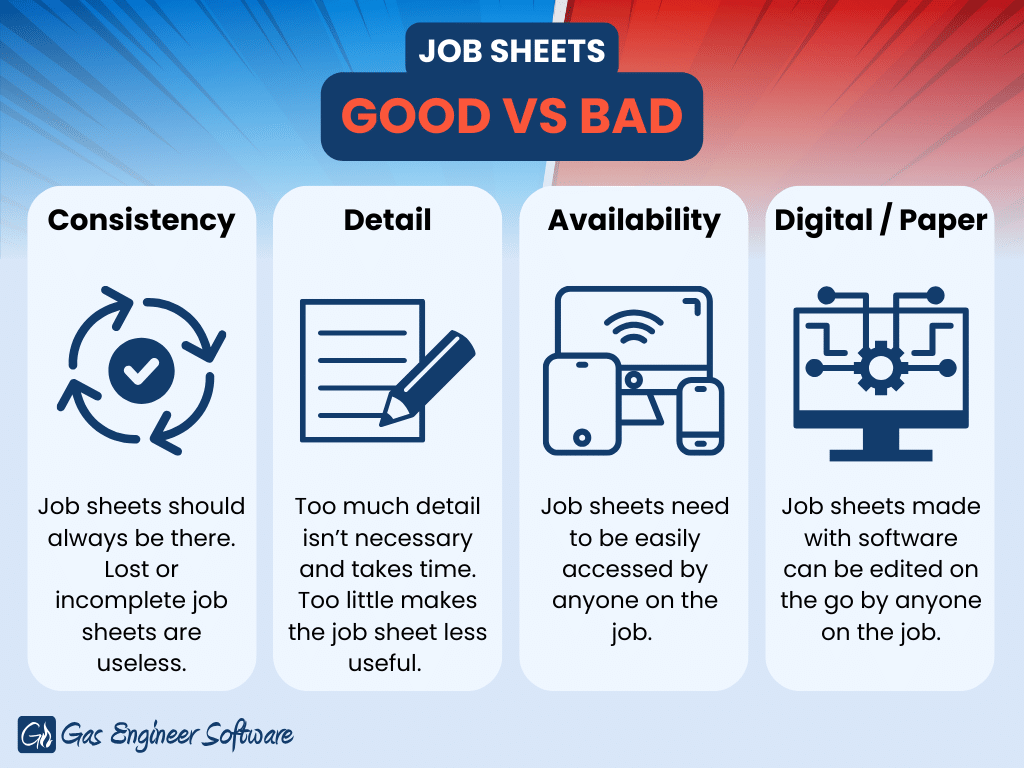
Consistency
Missing or incomplete job sheets make record keeping a nightmare. While they aren’t a binding document in the same way a Gas Safety Certificate might be, job sheets are crucial. If some jobs don’t have a job sheet and others are lacking crucial info, your engineers can’t rely on them as second nature.
Detail
Information needs to be there for it to be useful. At the same time, useless information just makes things messy. Information should be kept short, clear, and to the point.
Availability
Everyone involved with the job needs to be able to access the job sheet. If it’s left at home, in the office, or in the back of the van, it just becomes an annoyance.
Digital templates make it easy to give the whole team easy access. You can find a free job sheet template here, but this brings us to our next point.
Digital or paper?
Better than a template is making job sheets online or through software. Platforms like Gas Engineer Software means you can edit, modify, and view job sheets on the go. You’ll also be able to add pictures.
Working with Gas Engineer Software
Job sheets are designed to help your business run smoother and employees be more productive. Job management solutions like Gas Engineer Software have the exact same goal in mind.
Combining the two is a natural step forward.
Using software to create job sheets helps speed up the entire process and keep everything under control. Handwritten job sheets and to-do lists are messy and easily lost, and Microsoft Word files or PDFs have to be constantly sent back and forth so everyone has the most up-to-date copy. Cloud-based options like Google Docs are definitely a level up, but they still need to be manually created and sent across, and organising them ends up being a nightmare. Software offers several benefits:
- Everything is linked to your database of customer information.
- Job sheets can be accessed by anyone on the job within seconds.
- Updates are synced across your team.
- The organisation is done for you, and job sheets can be found by searching for customer names, job addresses, record numbers, and more.
- Job sheets are professionally designed to look sleek and professional.
- Invoices are easily generated with the same information.
Integrate software into your workflow today and try Gas Engineer Software for free.
Next steps:
If you’ve been thinking about implementing software into your workflow to save time, here’s what you can do next:
- Visit our resources centre where you'll find more articles like this one and our free gas rate calculator.
- Start a free trial to see exactly how our software works for your business.
- Watch our video demo to get an idea of how our software works. You can also book a 1-on-1 session with our customer success team for a more personalised experience.
- Know an engineer who's still using paper? Help them and us out by sending our software their way!
